In the spring of 2019, as Enkeshi El-Amin typed the final words to a project culminating six years of exhaustive study into the lives and histories of Black Appalachians, all she could say was thank you—to the men and women who welcomed her into their homes to share their stories, sat with her as she dug through articles and archival photos past midnight, and cheered her on as she built a platform to voice the stories of the otherwise invisible.
“This was my love letter to Black Knoxville,” says El-Amin, a lecturer in the sociology department and the university’s first PhD graduate with a concentration in critical race and ethnic studies.
In the acknowledgments to the project, “Chocolate City Way Up South in Appalachia: Black Knoxville at the Intersection of Race, Place, and Region,” which served as her dissertation, she wrote, “My completing this degree is a testament to strength of the people who came before me and those who walk with me. I do not take it lightly that many people have had to take many steps and make many sacrifices for me to get to this place.”
El-Amin’s place in this world isn’t so easy to explain. She was born far from Appalachia in Guyana, a small, culturally rich nation on South America’s northern coast. In 2013, she arrived in Knoxville from Brooklyn, New York, where she had spent two years working with youth in a YMCA after-school program. Having already earned a bachelor’s degree from Agnes Scott College and a master’s from Syracuse University, she joined the sociology department with a vision for making an impact that extended beyond academia into the communities she researches.
“Enkeshi sets a model for faculty and students of how to do community sociology in a really meaningful way,” says Michelle Christian, associate professor and director of undergraduate studies in sociology. “She does what sociologists say we should do but commonly don’t. She’s a trailblazer.”
She’s Like Wi-Fi
After graduating, El-Amin was invited back to the sociology department to serve as a lecturer. Currently she teaches social problems and social justice, community sociology, and capstone courses for undergraduates.
She continued to embed herself in Black Knoxville, too. While preparing for her first year as a faculty member, El-Amin launched Sew It Sell It, a sewing camp that teaches crafts and entrepreneurship skills to children eight to 15 years old. This year she also founded The Bottom, a community space for Black creatives named for the historically Black Knoxville neighborhood lost to urban renewal in the 1950s.
Like other trailblazers who came before her—the ones who took the Volunteer Creed to heart and got to work—El-Amin saw the need for a bridge between academia and the community, and she built it, recruiting others to help her along the way. Somebody once told her that she’s like Wi-Fi: she connects people.
“I didn’t take the path you’re supposed to take as a PhD student,” El-Amin says. “I stayed when I was supposed to leave. Knoxville became home. And now I have the opportunity to create something for the community—to infuse research with social and public life. That’s what I’m here to do.”
MAKING AN IMPACT WHERE SHE STANDS
The first time Javiette Samuel, UT’s assistant vice chancellor for diversity and engagement, heard El-Amin speak was at the Critical Race Collective Symposium, a 2019 campus event where she presented her dissertation research.
Samuel approached El-Amin during a break. In subsequent meetings she learned about Sew It Sell It, at the time an idea El-Amin was in search of funding to launch. Samuel suggested she apply for a mini-grant with the Office of Community Engagement and Outreach. She submitted a joint application with James Williams, associate professor in the Department of Retail, Hospitality, and Tourism Management, before applying on her own in 2020. Overall, El-Amin has received $3,200 to help Sew It Sell It grow to serve more than 30 kids.
“What Enkeshi does is the best of both worlds,” Samuel says, referencing the way El-Amin weaves together public engagement and scholarship. “It’s the scope that is so impressive: what she does in the Black community, how she provides opportunities for young people, particularly children in the center of the city, to express their creativity and develop a skill set, how she connects with business owners.”
Since she first arrived in Knoxville, El-Amin has committed herself to making an impact wherever she stands. She was fundamental to building sociology’s concentration in critical race and ethnic studies. As a student, she organized recruitment trips to historically Black colleges and universities and brought in speakers and resources to improve the program. She and some friends launched the Multicultural Graduate Student Organization to support students of color across all disciplines.
“If Enkeshi sees something that needs to happen, she does it,” says Christian.
It doesn’t matter whether this something is in a classroom on Rocky Top or in the neighborhood.
The Bottom Reborn
Six years ago, El-Amin mentioned to her husband, Jihad El-Amin, that her Guyanese grandmother—a larger-than-life figure in her family—had been a seamstress. That Christmas, he surprised her with a sewing machine. It wasn’t long before El-Amin had sewn her first clutch, built a website, and established a business, Klutch Queen Collections.
“Enkeshi doesn’t sit on an idea,” Jihad says. “She’s a force of nature.”
At an Emancipation Day celebration at Chilhowee Park, she met Knoxville artist Kelle Jolly, who organizes the annual Women in Jazz Festival and hosts Jazz Jam on WUOT (the NPR station licensed to UT). The two women hit it off, talking about sewing, their work in the community, and the journeys that led them both to Knoxville.
When El-Amin decided to transform her business into a community project, launching Sew It Sell It in summer 2019, Jolly immediately became involved as a mentor.
In the dozens of hours they spent together serving, Jolly and El-Amin, who are both appointees to the Mayor’s Maker Council, often spoke about what it would mean for the city to have a Black space for artists, musicians, poets—a place where the community could come together, whether they were new to Knoxville or traced their roots back for generations.
“It seems simple, but it defines quality of life when you can find a place where you feel like you’re represented and your voice is heard,” Jolly says.
This past summer, El-Amin opened The Bottom with the support of partners, funders, and many community members who donated fabrics, books, meals, and sewing machines. It is the first place like it in Knoxville.
“The Bottom fulfills the vision of ‘We shall overcome,’” says Charice Starr, education team member for Highlander and a 2015 social work alumna. “It’s a reclaimed space, amidst all the industry and gentrification, for the Black community.”
Starr, like Jolly, has spent many days at The Bottom throughout the pandemic as the Highlander staff works from home. El-Amin has offered it up as a safe co-working space for those displaced by COVID-19 and in need of connection.
“Black people who were born here or have been in the city a while have had to burrow their own paths,” says Charles Lomax, a second-generation Knoxvillian and director of community empowerment for the City of Knoxville. “When you’re relocating to Knoxville for college or a job, you’re going to seek out that space where you can gather and find like-minded, passionate people. This is really a game changer for the city.”
Lomax believes The Bottom will play a crucial role in the retention of Black professionals in the area.
“Our community needs this space,” Lomax says.
Building Bridges
During a Sew It Sell It camp this past August, El-Amin spoke to the children about confidence, self-reliance, leadership, and entrepreneurship—how they can be difference makers and find success on whatever path they choose. At one point, she sat down next to a girl and asked what she wanted to be when she grows up.
“Either a psychologist or a judge,” she told her.
“So I asked her, ‘Do you know anyone who does that?’” recalls El-Amin. “And she didn’t.”
But El-Amin does. She can help Knoxville’s youth envision what they can become by putting the right people in place to support them. This is what is incredible about the bridge she’s building. It is a co-labored effort. It is El-Amin sitting at a table with Jolly, Starr, Lomax, her husband, and dozens of other Black leaders from UT and the city to create something they have never seen before.
Two years ago, William Isom, director of community outreach for East Tennessee PBS, sat at a table at Yassin’s Falafel House with El-Amin.
“I kept hearing Enkeshi’s name, people telling me we had to connect,” says Isom, who has spent the past eight years documenting the role African Americans played in developing Appalachian history and culture through the Black in Appalachia project.
He asked El-Amin to serve as co-host of the project’s self-titled podcast, which premiered in August. To prepare, she received six months of intensive training in Boston through a Public Radio Exchange grant, an opportunity given to only six applicants.
“I deal with a lot of scholars,” Isom says. “Sometimes they have no real understanding of regular people’s lives. Enkeshi does.”
In the early days of COVID-19, Isom and El-Amin hit the road together to collect narratives. They drove down US 11E with the goal of stopping at historic Black sites in Strawberry Plains, New Market, Jefferson City, Greeneville, and other East Tennessee communities. While they were examining the cornerstones of a church in a historically Black community in Strawberry Plains, an older woman sitting on a porch across the street waved the two over. El-Amin rushed across the highway and they talked for 30 minutes on the woman’s porch. She and Isom were invited back for a cookout, though they had more stops to make.
“Enkeshi knows how to treat people like humans, not subjects,” Isom says.
That is what makes El-Amin’s place in this world a challenge to explain. She is a Black woman, an immigrant, and an educator. She is a researcher and community advocate, an artist, and a podcaster. She is a wife and mother. She is the answer to the question her two-year-old daughter will one day be asked about what it means to be a strong Black woman in America.
“A lot of people did a lot of things for me to be where I am today,” El-Amin says. In her dissertation acknowledgements she lists them all: those who survived the Middle Passage, those who saved up pennies and sent her across the sea to the United States for a college degree, those who cried with and supported her, those who opened their doors to her and believed she actually could leave her mark.
“It took a long time to find my path,” she says. “Now that I’m here, I want to bring people together and show them what’s possible. I want them to feel welcome and seen—to feel like their voices and stories do matter.”
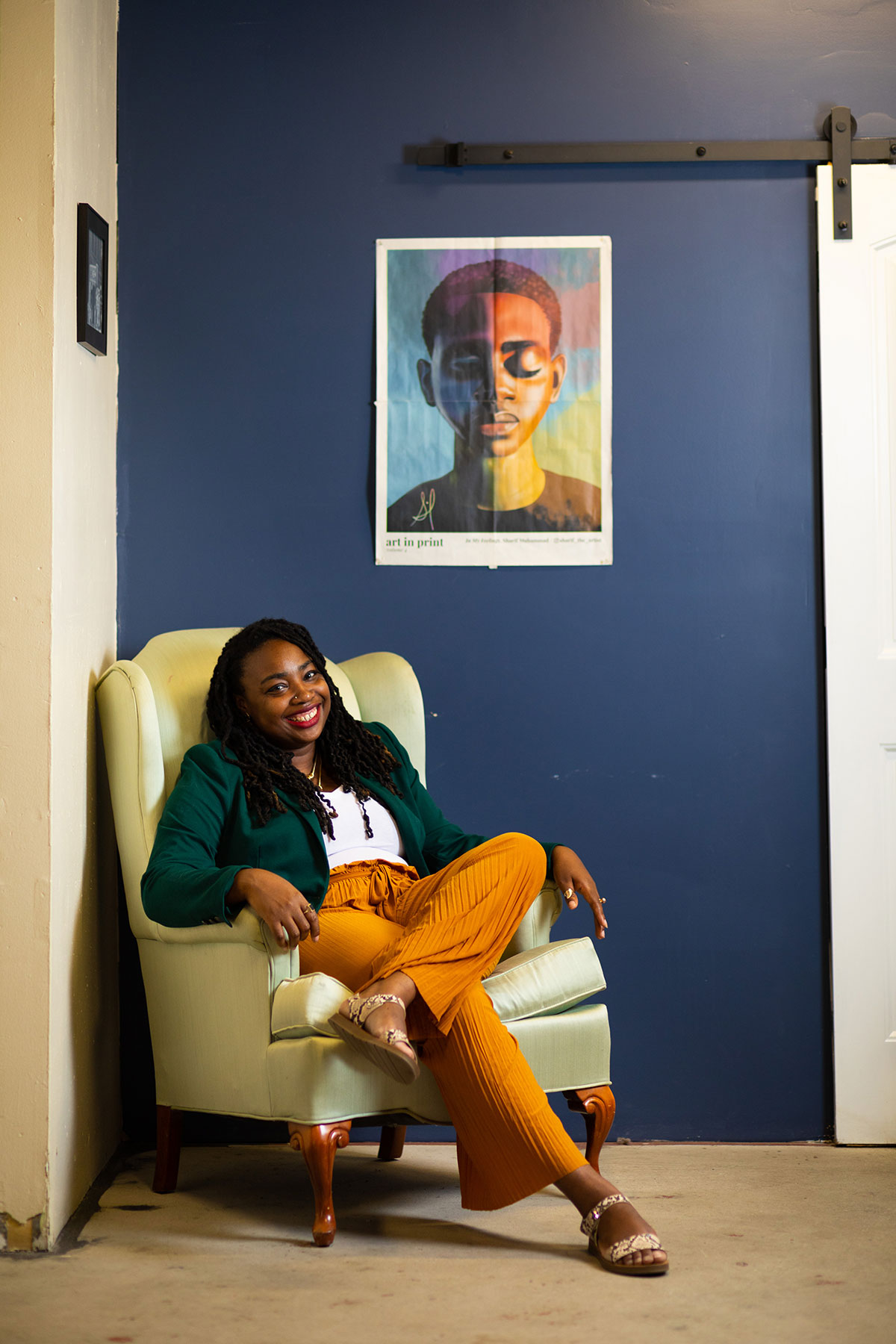
Photos by Steven Bridges

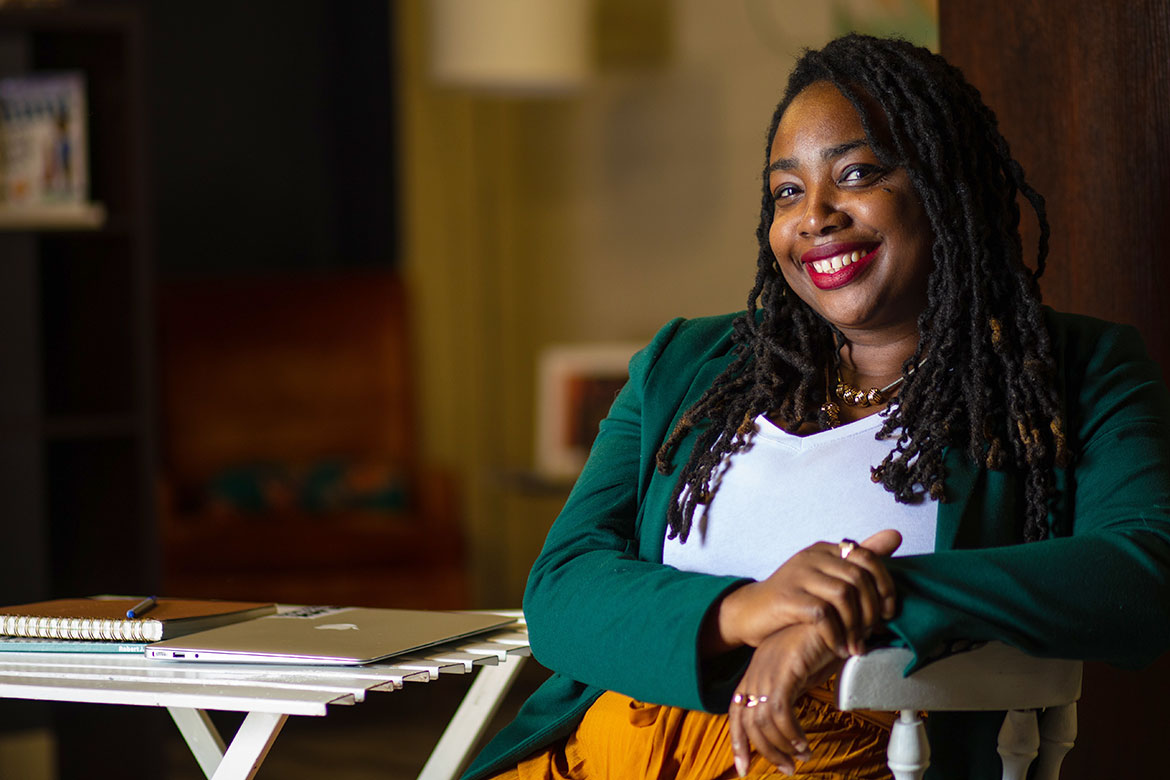
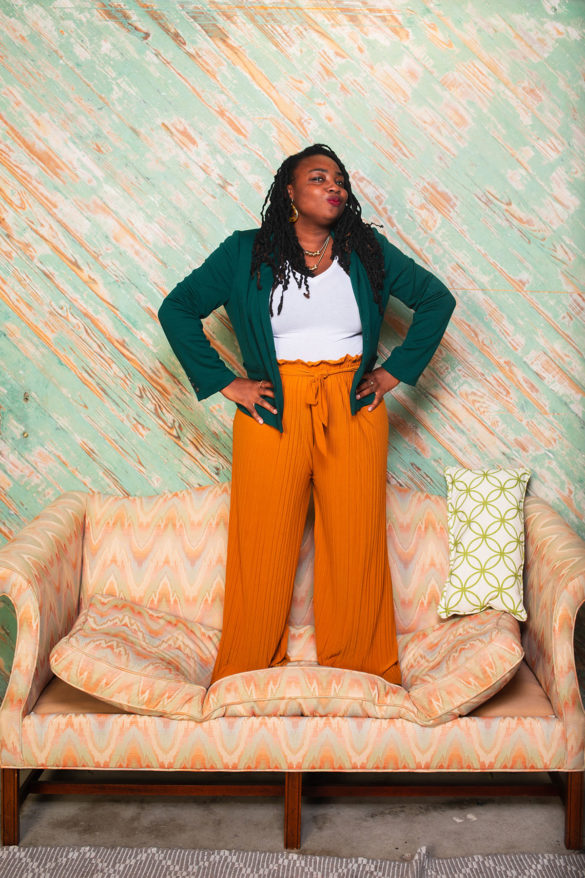

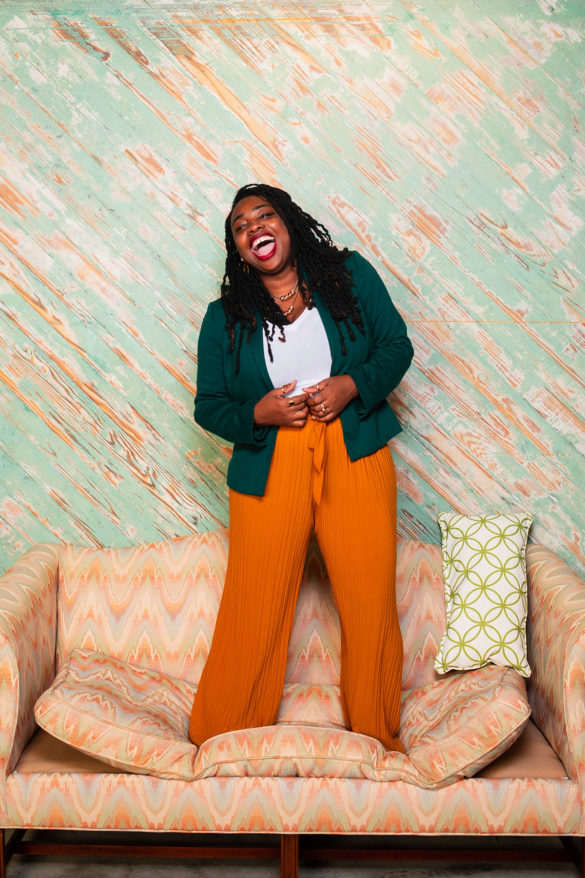
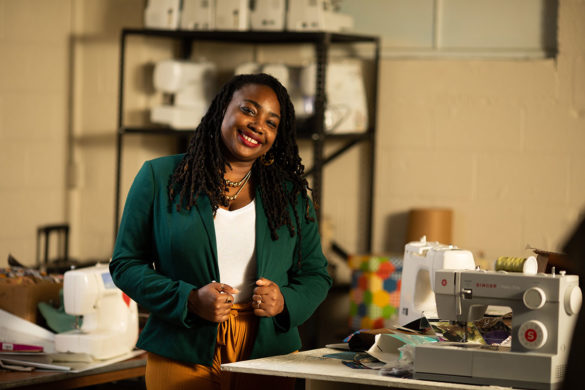
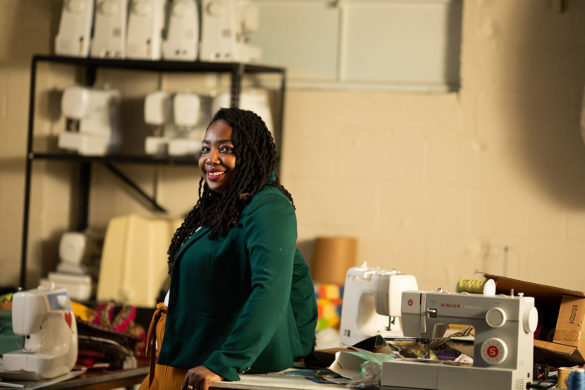
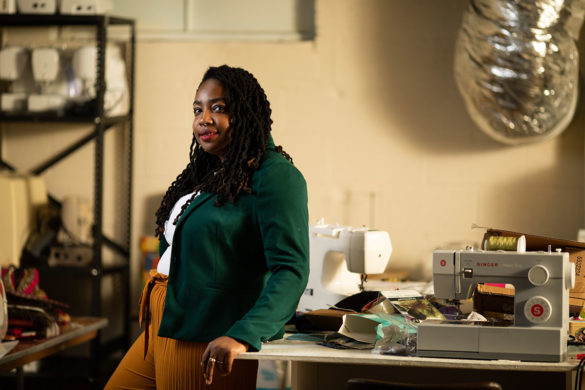
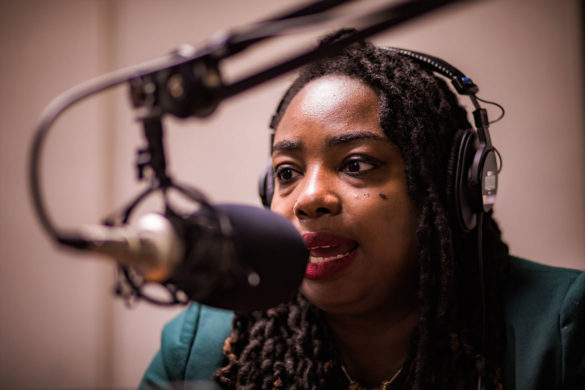
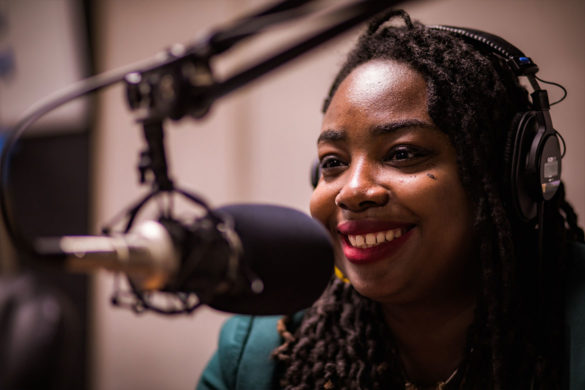
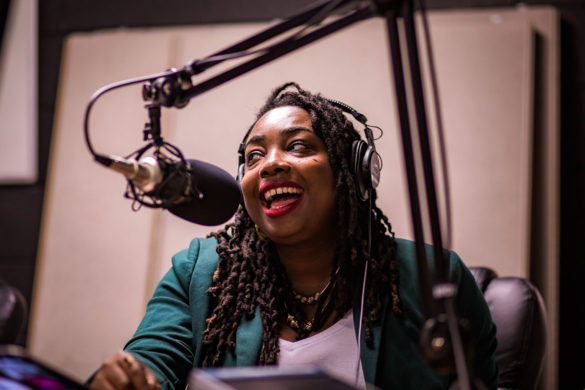
2 comments
I am developing a major resort in the Smoky Mountains which will have a theme of reconciliation for Appalachian culture. Please contact me so we can connect with your insight and amplify your voice. Scott Lucas
Like your concept, and energy to bring about an awareness to make a difference in the lives of people and at special youth of all races. Yes African American Youth needs assistance in awareness but also European American Youth need that Black Awareness. Let our embrace be different from many. Yoo
Comments are closed.